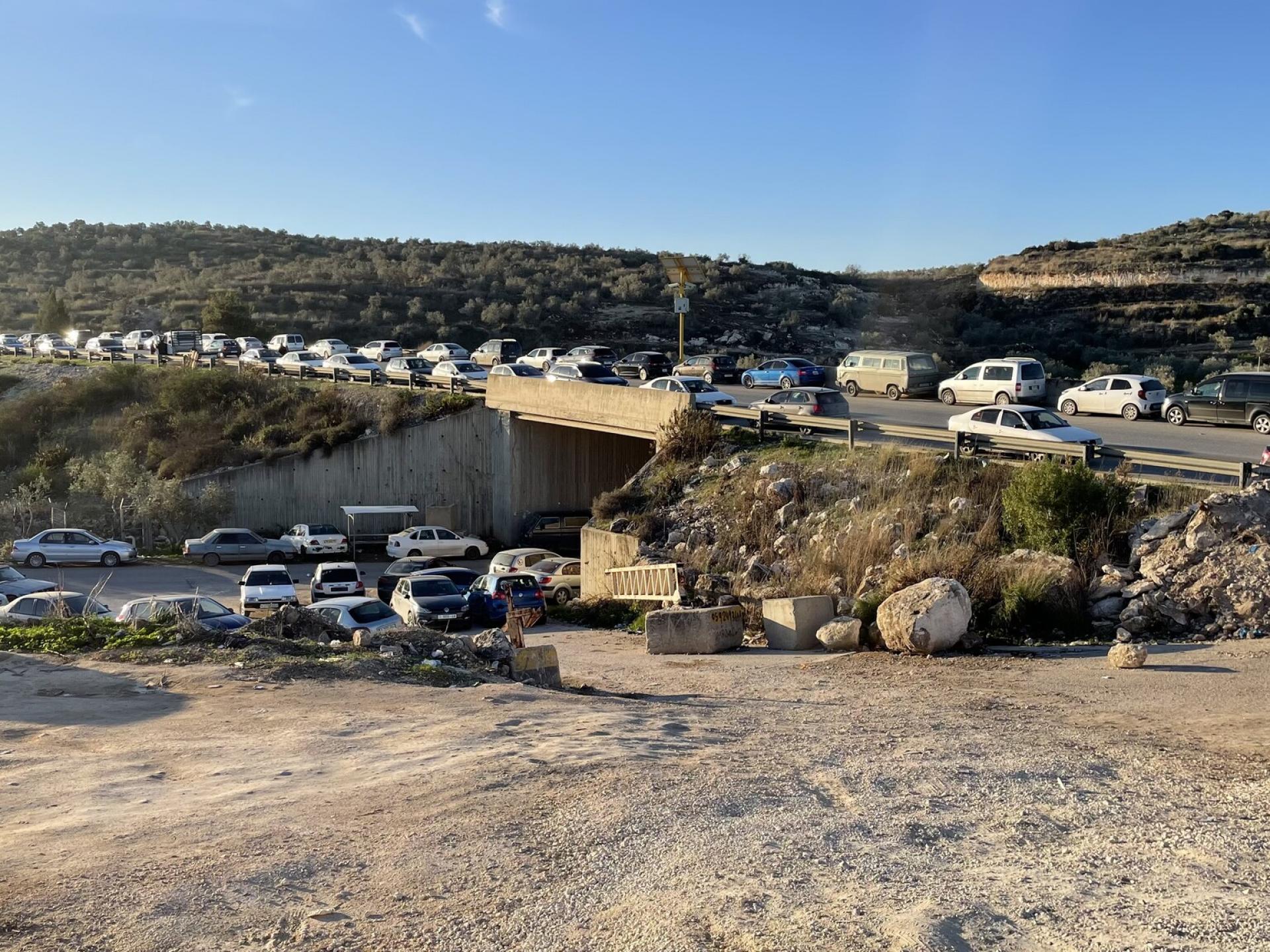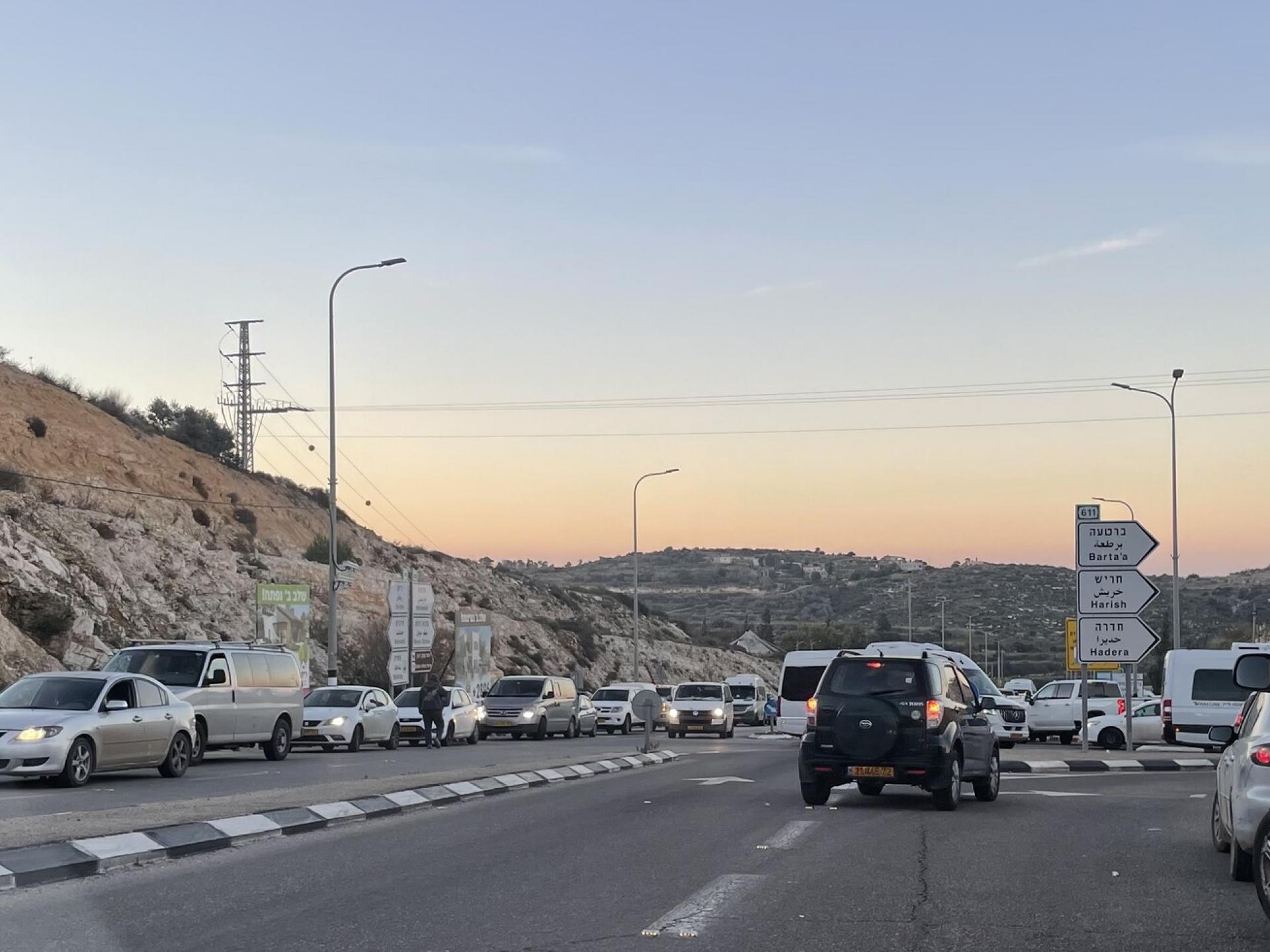What is happening in the parking lots near the town of Zabda?
06:30 – Tura-Shaked Checkpoint
Although the checkpoint’s main gate on the Seamline Zone side was wide open, the other gates were locked. Soldiers have not yet arrived. From the other side, we hear voices of those waiting, and a number of people are already congregating at the turnstile.
were locked. Soldiers have not yet arrived. From the other side, we hear voices of those waiting, and a number of people are already congregating at the turnstile.
06:45 – Barta’a-Reihan Checkpoint
We pass through the checkpoint. On our left – trucks in the parking lot, one truck on the way to check-in. On the right, to the west, an aligned area of land is revealed, on the slope at the foot of the remote parking lot. A worker claims that this is his territory.
07:00 – Ya’bed-Dotan Checkpoint
We don’t see soldiers. In the square opposite the guard tower, there is a car that we saw five days ago. It appears to us that this is a car that a Palestinian was forced to leave there. Two buses from the local Shomron Council arrive from the direction of the Mevo-Dotan settlement. The city of Ya’bed really shines in the morning light.
07:15 – Hermesh Checkpoint
Here, as in other checkpoints, they added sacks of sand to the cement blocks, even though they were abandoned some time ago. Not long ago, a soldier explained that the sacks of sand raise the cement blocks; a lesson learned from the killing of a female soldier at the Shoafat checkpoint.
On our way back to Barta’a Checkpoint, we decided to stop and park by the side of the road and survey the Zabda parking lots a bit. In the recent months it wasn’t clear why the parking in those lots is conducted irregularly, given that the need for parking has increased. Behind us, a vehicle whose driver can’t decide whether to park on the side of the road or to enter the parking lot. At times, even here, far from the checkpoint itself, drivers are fined. Needless to say, there is no sign prohibiting parking while the road edges here are wide. Finally, he decided to go up to the parking lot whose dusty earth is white chalk and the approach to it is winding, full of pits and potholes. Why don’t you fill them in and level them, even with a hoe, we wondered. The army doesn’t allow it, was the answer. Even a 4 x 4 vehicle that arrives from below, finds it hard to climb.
Today, for a change, the gate that blocked the rise from the lower to the upper road, was open.
The usher in these two parking lots is a young man from the nearby town of Zabda, who happily shook our hands. We couldn’t speak with him because of the language difficulties, but we realized that he charges each driver 5 shekels a day. We stayed there for about 20 minutes, talking to drivers, observed, and photographed. When we went down to the main road, the manager of the checkpoint suddenly appeared. He indicated something to the bouncer who nodded with understanding, turned the way he came and went away quickly. We didn’t understand the meaning of his quick appearance; is it related somehow to us? Is it related to the security guard in the booth at the exit from the checkpoint area who asked to see our identity cards, or related to someone who called him and afterward requested (politely) to inspect the trunk of our car as aell? We couldn’t help but to relating these things.
On our return, we saw a young woman standing alone at the bus stop, with a scooter. She was from Harmish. “Ah, a settler,” we said half in jest. “Me? A settler? Heaven forbid. I am settling! Like the pioneers!” She is a member of a cleaning group in Harish and sometimes accompanies nursery school children. She was not as young as we thought. Her oldest son is 23. She requested that we give her a ride, and she was also interested in us. We told her we were “leftists.” That amused her, but she didn’t fear that we would kidnap her even though we were ruining Israel. We brought her to the district she wanted and we wandered in the city of Harish, which is always changing.



